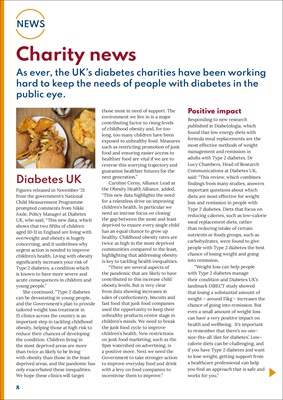
8
NEWS
Charity news
As ever, the UK's diabetes charities have been working
hard to keep the needs of people with diabetes in the
public eye.
Diabetes UK
Figures released in November '21
from the government's National
Child Measurement Programme
prompted comments from Nikki
Joule, Policy Manager at Diabetes
UK, who said, "This new data, which
shows that two fifths of children
aged 10-11 in England are living with
overweight and obesity is hugely
concerning, and it underlines why
urgent action is needed to improve
children's health. Living with obesity
significantly increases your risk of
Type 2 diabetes, a condition which
is known to have more severe and
acute consequences in children and
young people."
She continued, "Type 2 diabetes
can be devastating in young people,
and the Government's plan to provide
tailored weight loss treatment in
15 clinics across the country is an
important step in tackling childhood
obesity, helping those at high risk to
reduce their chances of developing
the condition. Children living in
the most deprived areas are more
than twice as likely to be living
with obesity than those in the least
deprived areas, and the pandemic has
only exacerbated these inequalities.
We hope these clinics will target
those most in need of support. The
environment we live in is a major
contributing factor to rising levels
of childhood obesity and, for too
long, too many children have been
exposed to unhealthy food. Measures
such as restricting promotion of junk
food and ensuring easier access to
healthier food are vital if we are to
reverse this worrying trajectory and
guarantee healthier futures for the
next generation."
Caroline Cerny, Alliance Lead at
the Obesity Health Alliance, added,
"This new data highlights the need
for a relentless drive on improving
children's health. In particular we
need an intense focus on closing
the gap between the most and least
deprived to ensure every single child
has an equal chance to grow up
healthy. Childhood obesity rates are
twice as high in the most deprived
communities compared to the least,
highlighting that addressing obesity
is key to tackling health inequalities.
"There are several aspects of
the pandemic that are likely to have
contributed to this increase child
obesity levels. But is very clear
from data showing increases in
sales of confectionery, biscuits and
fast food that junk food companies
used the opportunity to keep their
unhealthy products centre stage in
children's minds. We need to break
the junk food cycle to improve
children's health. New restrictions
on junk food marketing, such as the
9pm watershed on advertising, is
a positive move. Next we need the
Government to take stronger action
to improve everyday food and drink
with a levy on food companies to
incentivise them to improve."
Positive impact
Responding to new research
published in Diabetologia, which
found that low energy diets with
formula meal replacements are the
most effective methods of weight
management and remission in
adults with Type 2 diabetes, Dr
Lucy Chambers, Head of Research
Communications at Diabetes UK,
said: "This review, which combines
findings from many studies, answers
important questions about which
diets are most effective for weight
loss and remission in people with
Type 2 diabetes. Diets that focus on
reducing calories, such as low-calorie
meal replacement diets, rather
than reducing intake of certain
nutrients or foods groups, such as
carbohydrates, were found to give
people with Type 2 diabetes the best
chance of losing weight and going
into remission.
"Weight loss can help people
with Type 2 diabetes manage
their condition and Diabetes UK's
landmark DiRECT study showed
that losing a substantial amount of
weight - around 15kg - increases the
chance of going into remission. But
even a small amount of weight loss
can have a very positive impact on
health and wellbeing. It's important
to remember that there's no onesize-fits-all
'diet for diabetes'. Lowcalorie
diets can be challenging, and
if you have Type 2 diabetes and want
to lose weight, getting support from
a healthcare professional can help
you find an approach that is safe and
works for you."